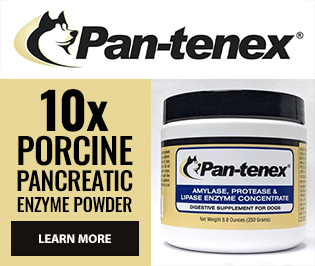Helping an underweight dog reach a healthier weight often requires more than just feeding larger portions. If your dog is struggling to gain weight despite eating regularly, digestive efficiency may be the issue. Pancreatic enzyme support can play a key role in improving nutrient absorption and ensuring your dog is actually benefiting from the food they eat.
Why Some Dogs Stay Underweight Despite Eating
Dogs who remain thin or underweight even with a consistent diet may not be fully digesting or absorbing the nutrients in their food. This can happen when their pancreas isn’t producing enough natural digestive enzymes, especially after illness, long-term gastrointestinal issues, or aging.
Undigested food means fewer calories and nutrients are absorbed into the body, leaving your dog hungry and thin despite proper feeding. In these cases, simply increasing the volume of food will not solve the issue.
How Pancreatic Enzymes Help with Weight Gain
Adding a high-potency digestive enzyme like Pan-tenex helps break down fat, protein, and carbohydrates in your dog’s meals so they can absorb more calories and nutrients from the food they’re already eating.
- Improved fat digestion: Helps dogs extract more calories from each meal and reduces greasy stools.
- Better protein absorption: Supports muscle development and overall body condition.
- More complete nutrient use: Enhances vitamin and mineral absorption, improving energy and coat quality.
Feeding Tips for Underweight Dogs Using Enzymes
- Feed smaller, more frequent meals to reduce digestive strain while delivering a consistent calorie intake throughout the day.
- Mix enzyme powder properly by placing in moistened food and letting it sit 10–15 minutes before serving to activate the enzymes.
- Choose calorie-dense foods with high protein and moderate fat content that are easy to digest.
- Use the correct enzyme dose based on your dog’s meal size to avoid over or under-dosing.
- Track weight, appetite, and stool quality using a tool like our Dog Enzyme Digestive Health Stool Tracker.
What to Watch For
When starting enzyme support, many underweight dogs begin to show signs of improvement within a few days to a couple of weeks. Keep an eye on:
- Stool consistency: Softer or greasy stools that begin to firm up are a sign of improved digestion.
- Appetite and energy: A dog that feels better inside will often become more eager to eat and more active overall.
- Gradual weight gain: Healthy gain happens slowly over time. Rapid weight gain may signal other issues and should be discussed with your vet.
When to Talk to Your Veterinarian
If your dog continues to lose weight, refuses food, or shows signs of other health problems, consult your veterinarian right away. While pancreatic enzyme supplements like Pan-tenex can dramatically improve digestion and weight gain, they are not a substitute for diagnosing and treating medical conditions that may be contributing to weight loss.
Final Thoughts
Helping your underweight dog reach a healthy weight often starts with improving how they digest and absorb food. Pan-tenex offers 10x potency pancreatic enzymes that can help your dog make the most of every bite. Combined with the right diet and feeding routine, digestive enzymes are a powerful tool in your dog’s path to healthy weight gain and vitality.
Need more guidance? Explore our related articles like Daily Routines for Dogs Needing Digestive Enzyme Support or What If My Dog’s Stools Are Still Soft or Diarrhea with Pancreatic Enzyme Use? for more support.

